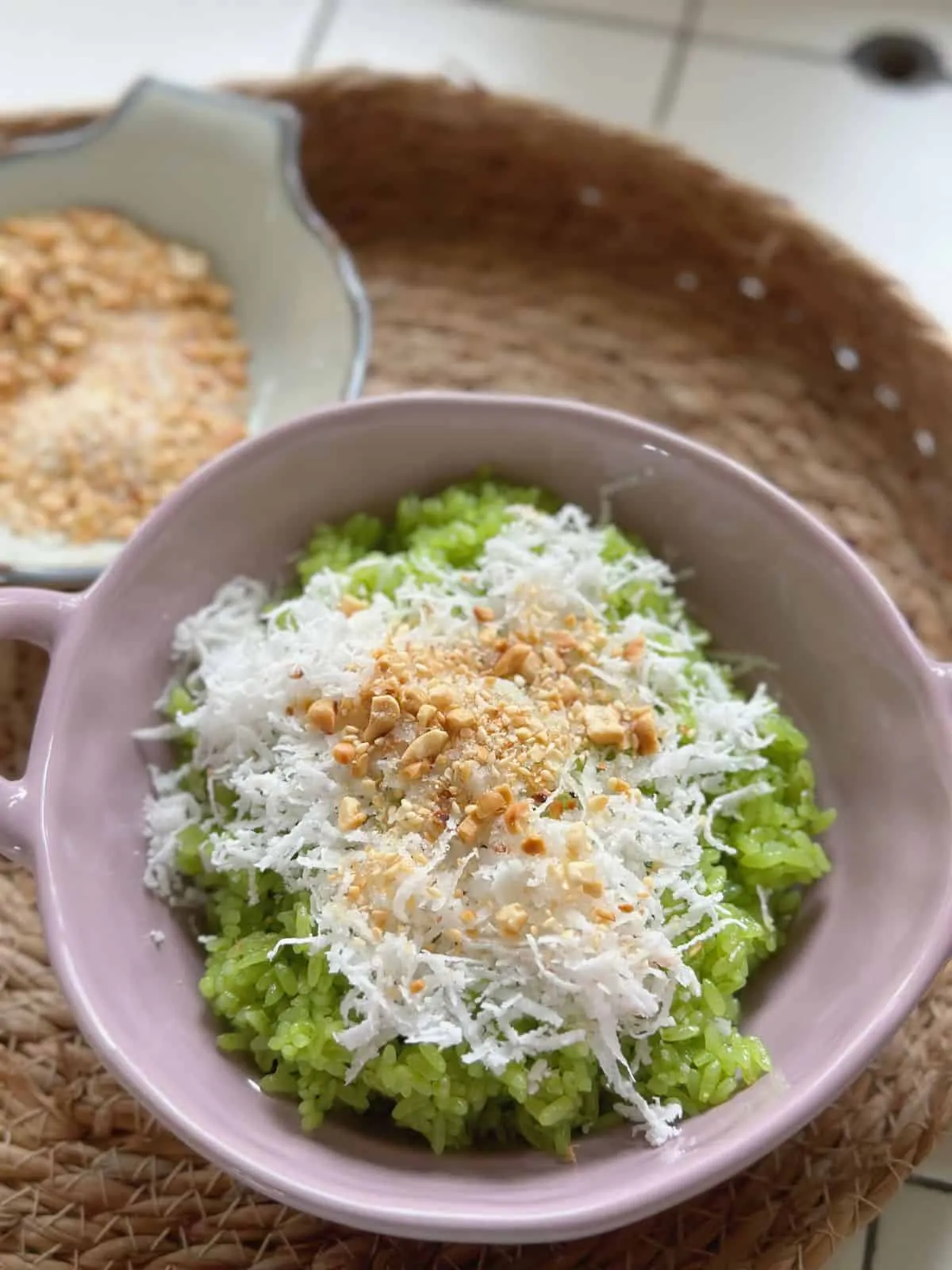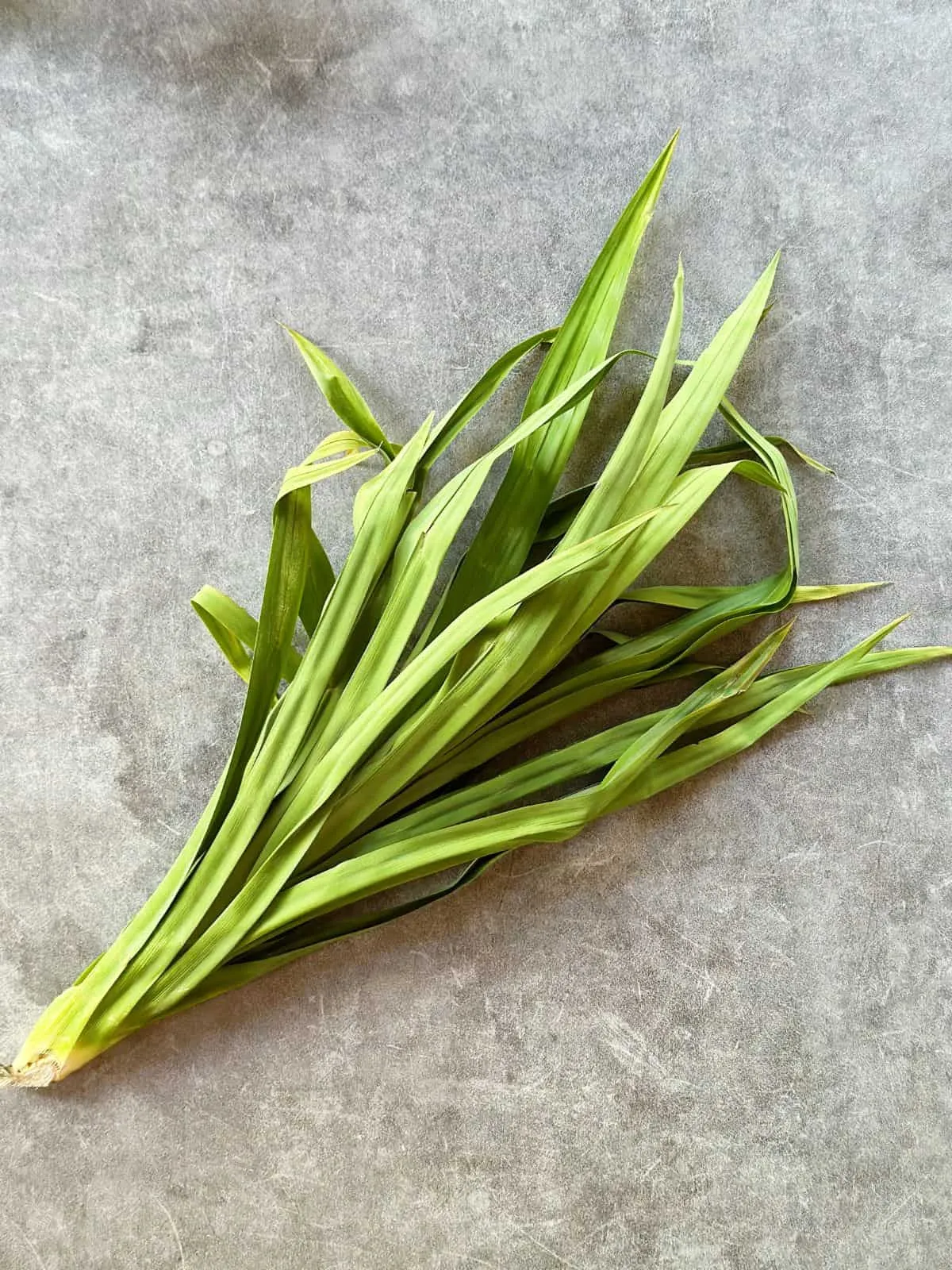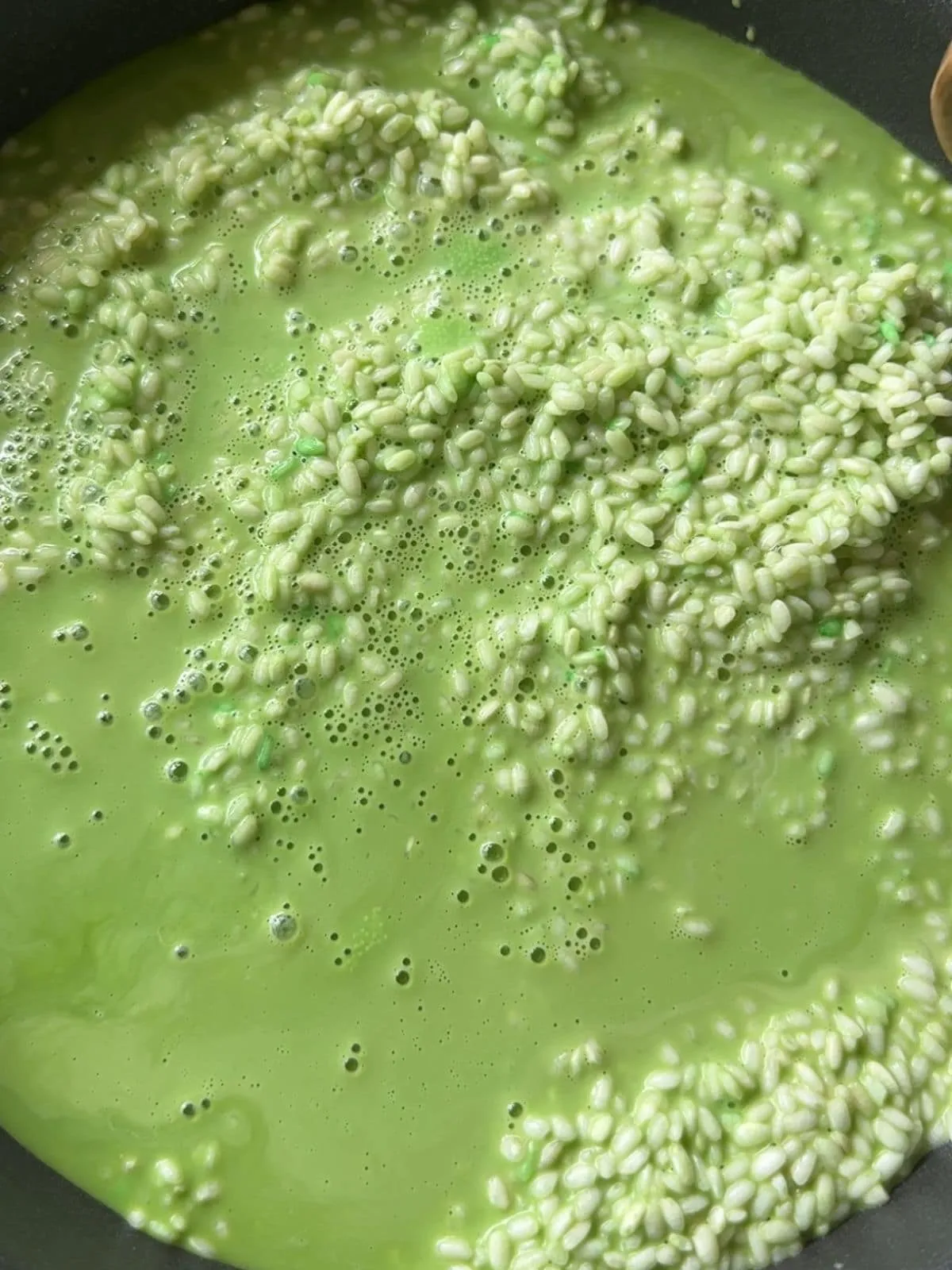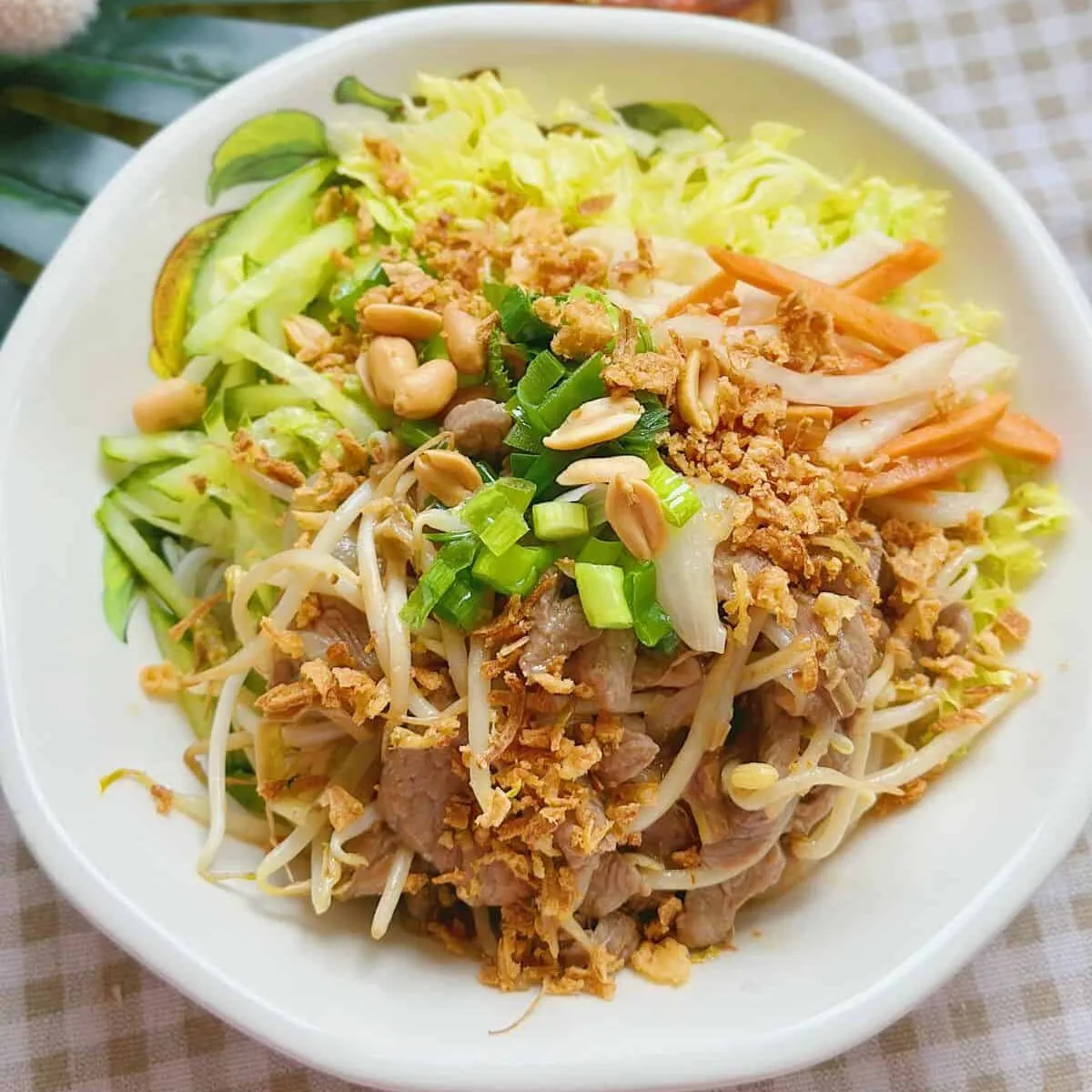Xôi lá dứa—pandan sticky rice—always takes me right back to the mornings in Vietnam when the streets slowly came alive with food carts and chatter. That soft green hue and the gentle, almost floral fragrance of pandan were enough to make me stop in my tracks.

What exactly is Xôi Lá Dứa?
Whenever someone asks me what Xôi Lá Dứa is, I always smile—it’s one of those simple dishes that carries so much heart. In Vietnamese, xôi simply means steamed sticky rice, while lá dứa is pandan.
We Southeast Asians treat pandan the way the West treats vanilla. Its fragrance is gentle but unforgettable—you’ll catch it in fluffy pandan chiffon cakes, creamy pandan ice creams, even the morning pandan bread.

Sticky rice itself is a big part of daily life in Vietnam, right alongside jasmine rice. And the fun thing is, it never shows up the same way twice.
We love pairing it with natural ingredients to make colorful, flavorful variations. Some mornings it’s Xôi Mặn, sticky rice dressed up with scallion oil, sausage, Chả Lụa (Vietnamese ham), and pork floss. Other times it’s Xôi Thịt Kho, a Northern favorite paired with braised pork and eggs, the kind of dish that feels like a warm family gathering.
For something simpler, there’s the comforting Xôi Đậu Xanh with mung beans, or the vibrant red Xôi Gấc, often served at weddings and Lunar New Year celebrations for good luck.

In Hanoi, I loved grabbing a packet of Xôi Xéo, with its layers of sticky rice, mung bean paste, and crispy shallots—cheap, filling, and full of flavor. And the list goes on: Xôi Đậu Đen with black beans, Xôi Vò with each grain coated in mung bean, or Xôi Gà with tender chicken.
No matter which version you try, Xôi isn’t just food—it’s tradition, memory, and comfort all packed into one steamy bundle.
How I came up with this pandan sticky rice recipe
When I moved to Germany, one of the things I missed most was a simple bowl of sticky rice. Out of curiosity (and a bit of impatience), I tried every quick method I could find—Instant Pot stick rice, rice cooker sticky rice, even the microwave sticky rice.

The tricky part is that sticky rice doesn’t behave like jasmine or basmati—it soaks up much less water. Cook it the same way you’d cook regular rice and you’ll end up with a mushy mess.
My grandma always knew the secret: she soaked the grains overnight, giving them plenty of time to drink up just enough water before steaming. The result was soft, fragrant sticky rice every single time. The only catch? You had to plan ahead.
Luckily, I recently learned a little kitchen hack from some Vietnamese aunties that felt like a small lifesaver—it skips the overnight soaking, yet still gives you delicious sticky rice in under an hour. Perfect for those days when the craving hits and patience runs thin.
And here’s something I love: the way we cook coconut sticky rice in Vietnam is a bit different from our Thai neighbors. Thai cooks usually steam the rice first, then gently fold in coconut milk and let it rest to soak up the flavor.
In Vietnam, we like to let the rice and coconut milk simmer together right from the beginning, so every grain is infused with that sweet, creamy richness as it cooks. Same ingredient, two traditions—but both equally comforting in their own way.
Ingredients
- Sticky Rice – This is the heart of the dish. I’m using Vietnamese short-grain sticky rice called Nếp Cái Hoa Vàng, prized for its chewy texture and fragrance. If you can’t find it, regular long-grain sticky rice will do just fine.

- Coconut Milk – Go for full-fat coconut milk here. It gives the sticky rice that rich, creamy depth that makes every bite so comforting.
- Pandan Leaves – Fresh or frozen pandan leaves are perfect, and most Asian markets carry them. Just one whiff and you’ll know why we love them so much.

- Pandan Extract (optional) – If you want that vibrant green hue, a few drops will do the trick. I often use my homemade pandan extract for a natural touch, but today I went with a store-bought one for convenience.
- Salt & Sugar – The simple pair that balances everything—bringing out the sweetness without making it cloying.
- Toppings – I like to serve pandan sticky rice with shredded coconut, a drizzle of sweetened coconut sauce, and muối mè (our sweet-and-salty sesame peanut sprinkle). It’s that final touch that makes the whole dish feel extra special.
You may also like | More Recipes with Pandan
Instructions
Step 1 – Wash the rice
Rinse the sticky rice 3–4 times until the water runs almost clear. This helps remove excess starch so the rice turns out fluffy instead of gummy. Drain well.
Step 2 – Make pandan juice
Rinse the pandan leaves, cut them into small pieces, and blend with water. Strain the mixture through a sieve to get about ⅔ cup (150 ml) of pandan juice. If you’re a little short, just add more water to reach the amount.
Step 3 – Cook the rice with pandan
In a nonstick pan, combine the drained sticky rice, pandan juice, a few drops of pandan extract (if using), coconut milk, and a pinch of salt. Bring everything to a gentle boil, then lower the heat to medium-high. Stir now and then until the rice absorbs the liquid. You’ll know it’s ready when you can drag a spoon through the rice and a clear line appears.
Step 4 – Steam the rice
Transfer the rice to a steamer. If you’d like, lay a few pandan leaves at the bottom for extra aroma. Use chopsticks or your finger to poke a few small holes through the rice—this helps the steam spread evenly. Steam over medium-high heat for 30–40 minutes, depending on the amount of rice. About two-thirds of the way through, sprinkle in the sugar and gently fluff the rice. Continue steaming until fully cooked and fragrant.
Step 5 – Make the sesame peanut sprinkle (Muối Mè)
Lightly pound roasted sesame seeds and peanuts, then mix with roasted salt and sugar. It should be fragrant, nutty, and just a little sweet.
Step 6 – Serve
Scoop the pandan sticky rice onto a plate, top with shredded coconut, and sprinkle generously with the sesame-peanut mix. Serve warm and enjoy this comforting Vietnamese treat.




Helpful Tips

- Steaming time: Sticky rice has a mind of its own—sometimes it cooks faster, sometimes slower. Peek in every now and then, and stop when the grains turn soft and fluffy.
- Keep it warm: Sticky rice hardens as it cools. If you’re not serving right away, keep it warm in a steamer or reheat gently with a bit of steam before serving.
- Storage tip: Leftover sticky rice can be frozen. Wrap it in small portions with plastic wrap, then re-steam or microwave with a damp towel to bring it back to life.
Serving Ideas
Savory Pairings: Sticky rice makes a hearty base for grilled or fried dishes. Try it with Cánh Gà Chiên Nước Mắm (Vietnamese fish sauce wings) or Thịt Nướng (grilled pork)—just remember to skip the sugar in the recipe for a perfect balance.
Sweet Pairings: Take it to the dessert side with pandan waffles, scoop on coconut ice cream for Kem Xôi (sticky rice ice cream), or pair it with juicy mango for a fun twist on Thai mango sticky rice.
Sticky Rice Cake: Press the sticky rice into a mold to create Xôi Vị, a traditional sticky rice cake.
Turn It Into “Chè“: Got leftovers? Don’t let them go to waste—transform them into Vietnamese dessert soups like Chè Khoai Môn (taro dessert), Chè Đậu Trắng (white bean dessert), or Chè Chuối Nướng (grilled banana sticky rice with coconut sauce).
Find more of my favorite authentic Vietnamese recipes

(Cà Ri Gà)

(Bún Bò Huế)

(Bún Bò Xào)

(Gỏi Gà)

Easy Pandan Sticky Rice (Xôi Lá Dứa) in Under 1 Hour
Equipment
- 1 Steamer
Ingredients
- 2½ cup sticky rice (shor-grain or long-grain) (about 500g)
- 1½ oz pandan leaves (about 45g)
- ⅔ cup water (about 150ml)
- 1¼ cup coconut milk (full-fat) (about 300ml)
- 1 tsp salt
- 1 tbsp granulated sugar
- ⅛ tsp pandan flavor (optional)
- Shredded coconut
Muối Mè (Vietnamese Sesame Peanut Sprinkles)
- 2 tbsp roasted sesame seeds
- 4 tbsp roasted peanuts
- 3 tbsp granulated sugar
- ½ tbsp roasted salt (roasting the salt helps preserve the sprinkles longer)
Instructions
- Wash the sticky rice 3-4 times until the water is nearly clear to remove excess starch, which helps ensure the rice turns out fluffy when steamed. Drain thoroughly.
- Rinse pandan leaves and cut them into small pieces. Blend with water, then strain through a sieve to extract about 2/3 cup (150ml) of pandan juice. If needed, add extra water to reach 2/3 cup.
- In a nonstick pan, combine the sticky rice, pandan juice, pandan extract, coconut milk, and salt.
- Bring to a boil, then reduce to medium-high heat. Stir gently while the rice absorbs the liquid. The rice is ready when drawing a line through it leaves a visible path.
- Transfer the rice into a steamer, with pandan leaves at the base if you'd like an extra hint of fragrance. Make a few small holes in the rice using chopsticks or your finger to help the steam spread evenly. Steam on medium-high heat for 30-40 minutes, adjusting the time based on the amount of rice. About two-thirds of the way through, add the sugar and gently fluff the rice to combine. Continue steaming until fully cooked.
- Lightly pound roasted sesame seeds and peanuts, then mix with roasted salt and sugar.
- Serve the sticky rice with sesame peanut sprinkles and shredded coconut. Enjoy!


